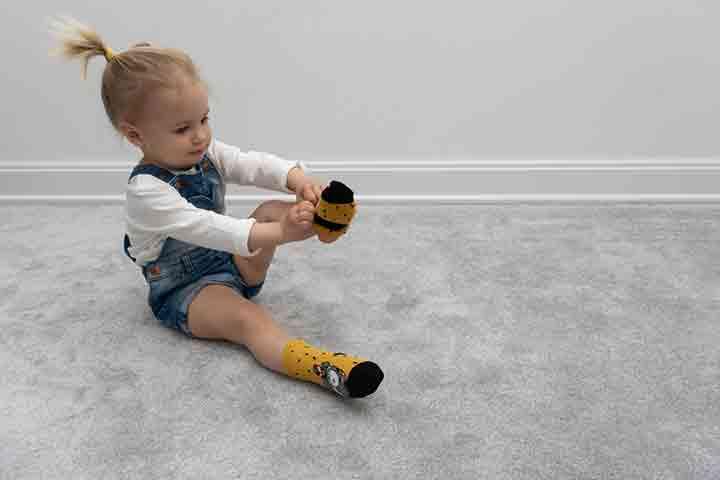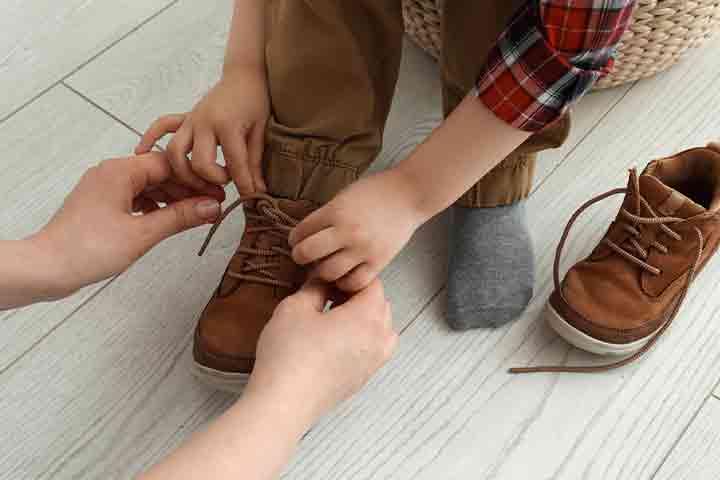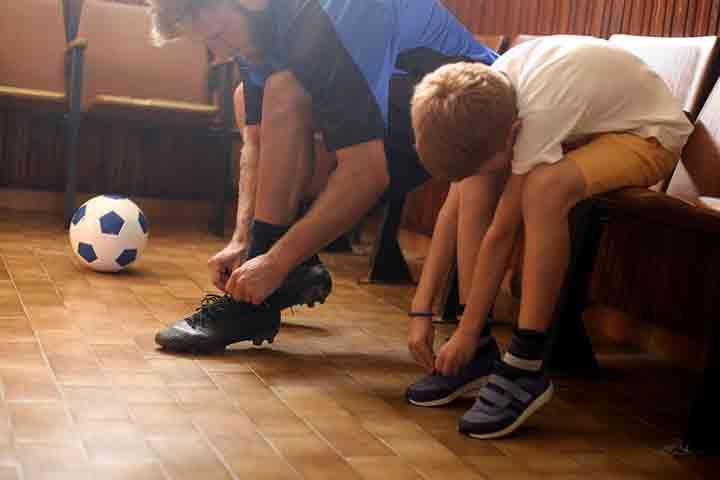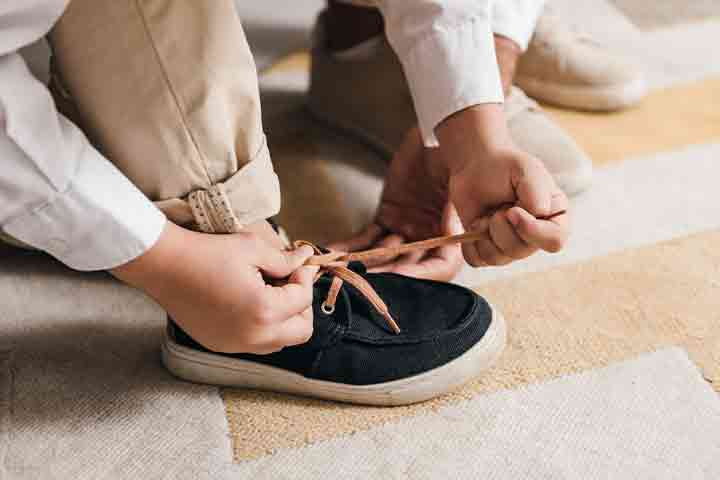
Image: Shutterstock
Teaching how to tie shoes for kids is one of the essential skills they should learn. Most children continue taking help from their parents to tie their shoes. However, it is best to let the child learn to do it by themselves at the earliest. It gives them a sense of accomplishment and independence. Tying shoelaces is not merely an activity of joy and fulfillment, but it is also related to coordination and development. Read on to know how you can teach your child to tie shoes.
Why Should Your Child Learn To Tie Shoes?
It is essential to their independence and helps them feel more confident at school. Learning to tie shoelaces can also help your child pick up some essential life skills, such as follows:
- As you teach them a step-by-step procedure of tying the shoelace, they will learn to listen carefully and follow the directions.
- Using their fingers to tie the shoelace, they would learn dexterity, which eventually helps them hold a pen or other things correctly.
- They understand sequencing with the process—socks go first, then shoes, and then tie the shoelaces.
Image: IStock
- They learn to sort and classify the shoes, such as winter shoes, summer shoes, etc., which helps them sort different objects.
- Regular practice helps them attain perfection that refines their fine motor skills, hand-eye coordination, visual perception, etc.
When Should You Teach Your Child To Tie Shoes?
As most children develop their fine motor skills by the age of five, it is the ideal age for them to learn tying their shoelaces (1). This is also when their hand and eye coordination develops and makes delicate tasks easier for them to perform. However, the age range varies from child to child. Some might pick it up earlier, while some may learn at an older age.
How To Teach A Child To Tie Shoes?
Image: IStock
Teaching an essential skill to children requires patience and devotion. Here’s how you can teach your child to tie their shoelaces:
- Teach more than one method of tying shoes just in case your child cannot grasp the concept from the first method.
- A fun way to teach is by learning together-lookup for a new method of tying shoes and tell your child to follow the same with you.
- Avoid using rough and thick laces. Prefer soft and thin shoelaces that are easy to handle by the little fingers.
- You can make marks on the lace parts that need to be held and folded. This will guide them even if you aren’t around.
- Teaching rhymes for tying shoes, such as “Bunny ears, bunny ears jumped into the hole”, or “Popped out of the other side, beautiful and bold,” could make it easier for your child to grasp the skill.
- Let them practice the entire procedure repeatedly while they rhyme it with their favorite songs. Practice can only ensure they learn the method correctly.
Steps To Teach A Child To Tie Shoelaces
Image: IStock
Here are some simple steps that you can refer to while you are teaching your kids to tie shoelaces:
- Knotting: Sit with your child and guide their fingers. Ask the child to hold a lace in each of their hands and criss-cross them to form an X. Don’t hurry them into getting it perfectly right at the first attempt. Use one lace to tuck it into the hole, and then tighten both the laces.
- Rabbit ears: Use one of the two laces and make a loop, resembling a rabbit ear. Show them how to make it and ask your child to pinch it between their fingers and carry on with the rest by themselves. This will give them a sense of independence.
- Wrapping: Instruct your child to wrap the second lace around the ear of the first lace. Allow them to handle it by themselves unless they require your assistance. You should allow them to learn how to perform the procedure single-handedly.
- Bunny ear: Push the other lace into the hole, making the second bunny ear. While doing so, you can guide them on how to have a good grip over the lace to put them together as tightly as possible.
- Whiskers: Pull the ears together and tighten them. Ensure the end of the lace, the whiskers, are as long as the ears. Lastly, applaud them for their achievement and encourage them to do it more often to attain perfection.
Image: IStock
Children take some time to pick up the concept of tying the shoelaces. Initially, it might be a little time-consuming, but eventually, they get it. You can turn it into a fun learning process that teaches them to do their things independently. Therefore, be patient with the process and let your child learn how to tie their shoelaces at their pace.
Frequently Asked Questions
1. How to teach my child to tie shoes using a bow knot?
Begin by wrapping one end around the other to tie a half knot and pull to make it tight. Next, form two loops with both ends and wrap the second loop around the first loop to complete the bow. Finally, tighten the knot and finish.
2. How to ensure the shoes stay tied for a long time?
To ensure that the shoes stay tied for a long time, you can use a reef knot, double knot, or square knot.
3. How to tie a double knot?
Start by making a bow knot and then pass the left loop over the top of the right loop and wrap it around the back. Next, pass the tip of the left loop through the hole created between the loops. Finally, tighten the double knot by pulling the loops in opposite directions.
Key Pointers
- Teaching kids to tie their shoelaces is one of the first steps towards their independence.
- It is a step-by-step process and requires patience from the parent’s side.
- Kids pick up the procedure faster when taught in an interesting manner with the help of rhymes or stories.
- It is an essential skill that helps enhance their motor abilities and cognition.
References:
- Developmental milestones.
https://www.choc.org/userfiles/file/Rehab-Developmental%20Milestones%20final.pdf




















